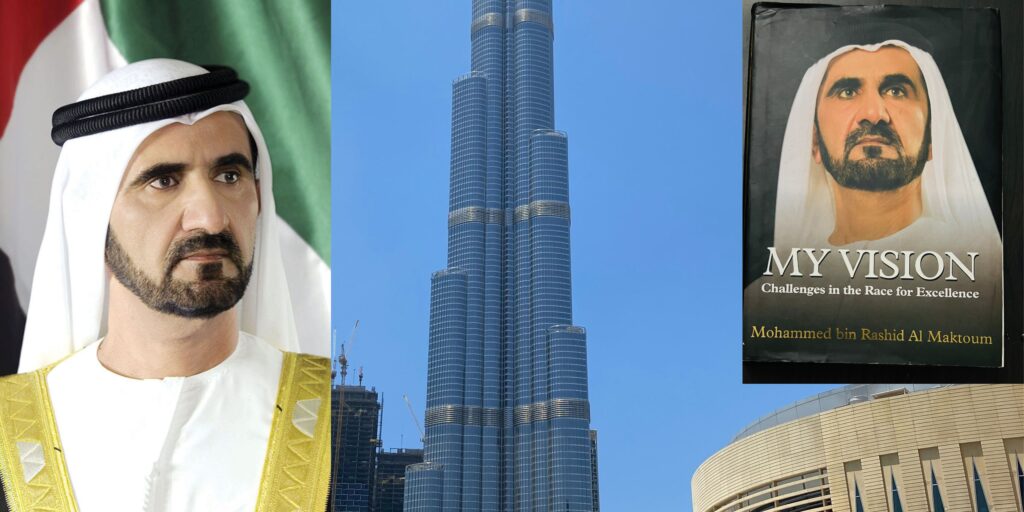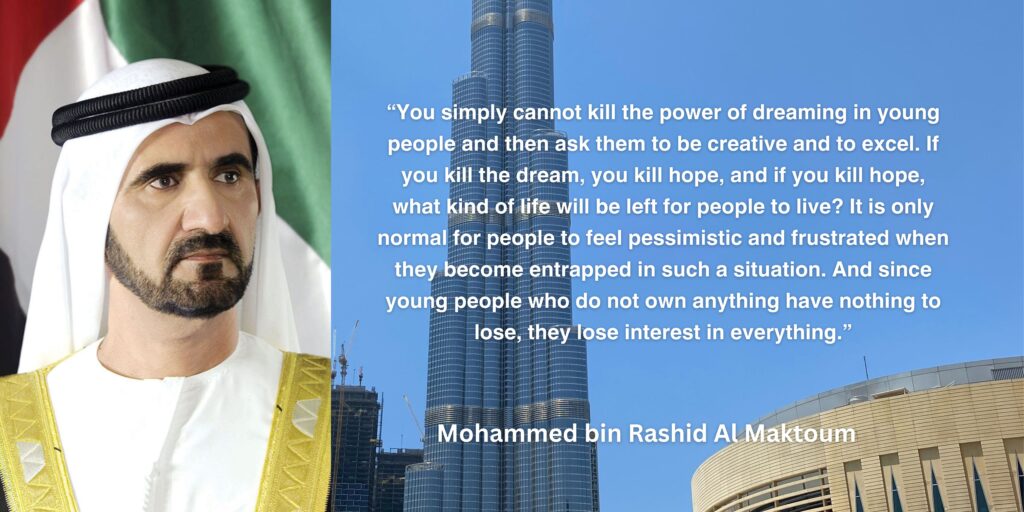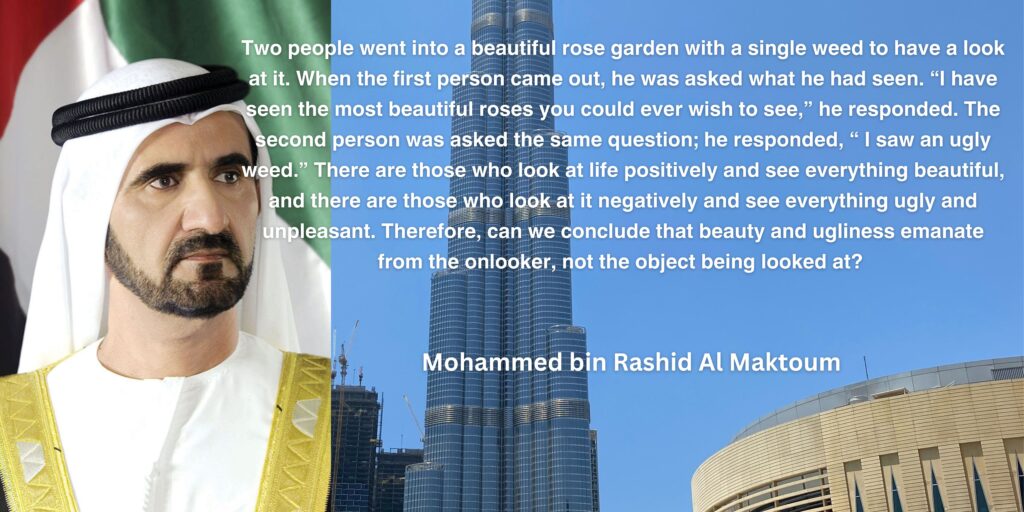Lessons from “My Vision” by Dubai Leader
“My Vision” by Mohammed bin Rashid Al Maktoum, the leader of Dubai, is one of the most relatable and inspiring books I have read about leadership and development1. I have learned a lot from the book, and the following are a few lessons I want to share.

Lessons from the Lion and the Gazelle Story
The story of the lion and gazelle summarises the daily struggles of life.
According to the Lion and the Gazelle story, each new day in the wildlife parks or jungles, a gazelle wakes up knowing it must outrun the fastest lion or perish. At the same time, a lion stirs and stretches, knowing he must outrun the fastest gazelle or starve. Therefore, whether you consider yourself a lion or a gazelle, you have to run faster than others to survive. This implies that we must all seek to achieve excellence because it is an absolute necessity for us to keep moving forward. If we cannot achieve excellence, we will eventually fall behind and lose the race. Losing the race not only puts you at the end of the herd of gazelle, but it also brings you a step closer to the jaws of the lion. This emphasized that the quest for excellence must be a lifestyle and not a choice if you want to survive and excel in life, regardless of who you are. Whether you are the prey or predator, you must understand that laziness can either make you perish or starve.
Lesson on Revolutionary Spirits
Life in Africa before and after colonization is the most relatable regarding revolutionary spirits. Our African ancestors had their revolutionary spirits intact and were daring and brave. However, colonization and its consequences made Africa lose its revolutionary spirit. So far, attempts to regain it seem impossible. According to the author, when a country or people lose their revolutionary spirits, they become imitators and followers. This can be seen in the language we speak, how we dress, the food we eat, and how we practice our democracy. It is clear that we must prioritize finding our revolutionary spirit so that we will have the confidence to lead and become pioneers again as Africans. It is possible.
Lessons on choosing the future
When reading this chapter, I remembered several statements made by people who bet their lives on luck or act as if God would come down and solve their issues. Many people abuse the term “God will provide” to mean God will cater to you whether you plan your life well, work hard, and make sacrifices or not.
However, Mohammed bin Rashid Al Maktoum said, “We cannot sit idly by and say that we do not know what will happen in the future because if we let events shape our future, they could dictate a scenario that we do not want; and if we let others make our future, they will give us the future they want and not one that we envisage. If we do not choose the future, we will be choosing the past. Our past was glorious, but it cannot dictate our present or future. We are not required to free ourselves from the past because it lives in our conscience, but we have to free ourselves from staying in the past. Our present should be our starting point, and the future should be our target. We must decide how to build the future.” Therefore, choose the future and let the past remain in your conscience.
Lessons on Management and Decision-making
It is no news that development projects in the interest of the citizens of a country are mostly long-term projects which might have no immediate direct benefits. However, in order to please citizens, many leaders implement short-term projects with immediate benefits but have devastating impacts in the long term. Such practices only dull the pain and don’t cure anything. As the author emphasized, “Part of our problems in the Arab world is that many decisions do not serve the real interest of Arabs, nor improve their economic and living conditions, but are meant to please them. This is not the cure our community needs but a drug that partially dulls the pain, only to see it recur with added venom.” He added that the relationship between a leader and his people is similar to that between parents and children. Often, what children desire to do now might be detrimental to their future development. So, as a parent, will you choose to please your child and let them indulge in behaviours that will give them immediate joy but destroy their future in order to be perceived as a loving and caring parent? Understand that allowing such behaviours does not make you a good parent. If parents want to successfully help their children move from one stage of life to another, they must exercise the right amount of firmness. Although this might be a bitter pill for some, it is not a high price for securing a healthy future for your child. Therefore, leaders must learn not to throw sweets at their people to dull the bitterness but to allow them to go through it together and guide and support them to become stronger.

Lessons on Excuses and Justifications
Our leaders have used many excuses for the depreciation of the cedi, high inflation, and unemployment over the years. Those excuses are well-known among Ghanaians. This statement by Mohammed bin Rashid Al Maktoum really got to me.
“We can provide scores of excuses to justify our managerial backwardness; we can blame circumstances or other people, and we can complain about the lack of suitable conditions and so on. But in the end, we only have ourselves to blame. When we fail to manage our development, economy, investment, and human resources, it is only normal that we fail in everything else. South Korea and Taiwan have become powerful industrial states against the backdrop of difficult military, political and economic circumstances. Therefore, it is no longer possible or correct, therefore to use major national or international issues as an excuse for our managerial failures.”
Therefore, no matter how long our excuses are, our problems require solutions, and the last time I checked, no amount of excuses can solve a problem. So, the earlier we get to understand the root cause of our problems, the earlier we can solve them and look forward to the next problem.
Lesson on People’s Spending Power
In simple terms, people’s spending power in economic development implies that a country’s economy can only grow if the majority of its people have money to spend on goods and services always. This means it is in the interest of every leader to work towards enriching its citizens to ensure business growth and the country’s economic development. As the author said, “When a leader succeeds in distributing wealth to a large number of people, he will motivate them to spend more and speed up the economic cycle. Working for the good of the people also means working for the good of the business community, the pillar of the national economy. The government does not spend; it is the people who spend money to boost the economy. So if many people have wealth to spend, the nation will progress.” This means the poorer most people are in a country, the more devastating businesses become, ultimately leading to the near collapse of the economy.

Lessons on Corruption and Bureaucracy
While some issues are not new, reading about the same things from the perspective of leaders, rulers, and people from different cultures and countries makes you smile despite it being a sad and worrying situation. Mohammed bin Rashid Al Maktoum, the ruler of Dubai, stated, “When bureaucracy is rampant, corruption is widespread, equal opportunity simply does not exist, and most jobs and promotions are obtained through powerful people, result in a situation that leaves people with no hope for the present or future. This environment produces demoralizing citizens who cannot achieve any goals, one who cannot even dream about a better future because he is afraid to face the entire reality when he wakes up each morning.” The paradox in this situation is that it is not only hypocritical but heartless for a leader to watch corruption and bureaucracy overwhelm his country and, at the same time, demand creativity and excellence from the people. So, this got to me when the author said, “You simply cannot kill the power of dreaming in young people and then ask them to be creative and to excel. If you kill the dream, you kill hope, and if you kill hope, what kind of life will be left for people to live? It is only normal for people to feel pessimistic and frustrated when they become entrapped in such a situation. And since young people who do not own anything have nothing to lose, they lose interest in everything.” Therefore, it is in the interest of every leader in Ghana and Africa to inspire hope and dreams so that young people do not lose interest in everything.
Lessons on Positive and Negative Energy
This lesson reminds me of pessimists and people who complain about everything without offering any solutions. Have you heard of the beautiful rose garden with a single weed growing in it story? According to the ruler of Dubai, two people went into a beautiful rose garden with a single weed to have a look at it. When the first person came out, he was asked what he had seen. “I have seen the most beautiful roses you could ever wish to see,” he responded. The second person was asked the same question; he responded, “ I saw an ugly weed.” There are those who look at life positively and see everything beautiful, and there are those who look at it negatively and see everything ugly and unpleasant. Therefore, can we conclude that beauty and ugliness emanate from the onlooker, not the object being looked at? Therefore, as citizens, we must learn to appreciate the efforts of our leaders, the greatness in each of us and our country, and be proud of our identity. I have come to appreciate that belittling yourself or your country to others does not make them love you more; it only shows them how you think and the level of negative energy within you.

Lesson on Educational Transformation
“I am convinced that teaching our children in the same way we did yesterday is in itself perpetuating a new kind of illiteracy that no longer has a place in any society that wishes to join the global race. People are the most important ingredient of the development process. Therefore, if we fail to educate young people, develop their skills and generate the spirit of excellence and creativity in them, we will never, under any circumstances, have a successful development process.” This statement means our educational system must transform itself to cater to future needs. Things have changed and will continue to change. Teaching students the same things as done decades ago is not only fatal but will sabotage the country’s development process.
Lesson on Faith and Prayers
Lastly, I appreciate that in everything you do, have faith in the will of God. However, faith in God does not mean everything will go as planned. But it will keep you focused and grateful regardless of the outcome of your endeavours in life. In addition, when you pray for your success, also pray for that of your family, tribe, neighbours, nation, and continent. If everyone prays for each other’s success, probably, God will listen to our well wishes and bless us all. Importantly, seek to please God and your conscience only in everything you do.
By: Huzeima Mahamadu
- Maktoum, M. bin R. A. (2012). My Vision Challenges in the Race for Excellence. ↩︎
